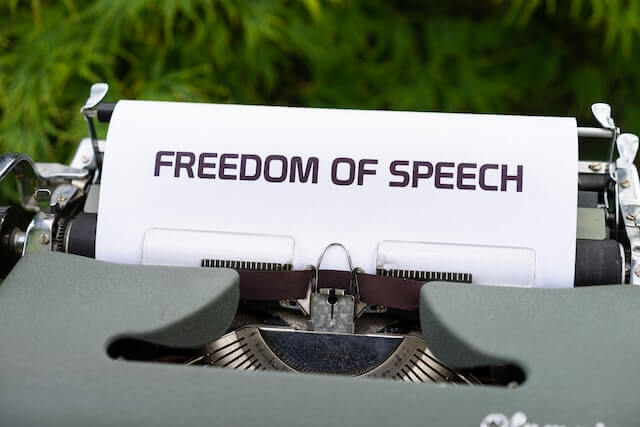Songs About Censorship
Conflicting moral standards, racial biases, generational value differences, and terror all contribute to music being censored. The majority of objections to music and the lyrics that go with it have centred on arguments that the songs are vulgar, violent, or damaging to children.
However, because of the increased availability of songs that the older generation views as unsuitable, technology and some institutions have reduced morality in the younger generation. Since drugs, violence, and sex were no longer taboo or kept a secret, authorities tried to regulate these subjects. What was censored and what was not was put under PMRC control.
Therefore, one would say that music is censored because of a variety of reasons, with an emphasis on the divergent viewpoints of younger and older groups. With that in mind, let’s look at some songs about censorship.
1. “Relax” by Frankie Goes To Hollywood
“Relax” is almost certainly going to be the first song that comes to anyone’s mind when they are asked to mention songs about Censorship.
When the song “Relax” was initially released, the band publicly claimed that it was composed about “motivation” in an effort to throw off the attention of censors. They then admitted that it was actually about “shaggin’,” which is slang for making out.
The song “Relax” by Frankie Goes to Hollywood is one of the earliest examples of blatant sexual innuendo that was successful enough to break through to the mainstream in the United Kingdom.
The broadcasters were appalled by Frankie Goes to Hollywood’s proud display of an unapologetic attitude on the single, which they listened to with disgust. The controversy became even grave due to the fact that the band contained two members who identified as homosexuals.
There are a few different music videos out there for the song “Relax.” The first one was directed by Bernard Rose and focused on homosexuality. Bernard Rose was also the director. It is believed that the BBC as well as MTV have forbidden its broadcast.
2. “Killing In The Name” by Rage The Machine
Shortly after the horrific riots that devastated Los Angeles, the home of Rage Against the Machine in 1992, their debut album “Killing in the Name” was released. Everything hinged on one horrible case of police abuse. A group of white police officers who brutally beat an unarmed black driver were acquitted in that tragic case. And even though the whole thing was caught on camera for all to see, the perpetrators were let off the hook.
To put it another way, the band is emphasising in the song’s lyrics that racism has long been an issue in the criminal justice system. Essentially, the band is claiming that members of the police forces are, in fact, KKK members (they are “the same that burn crosses”).
The Ku Klux Klan is widely recognised as a racist group that has a history of terrorising African-Americans in the United States. As police officers, these same individuals are now able to justify their murder of Blacks by claiming that they are doing so “in the interest of” law enforcement, rather than racial propagation or any other purpose. This is one of the songs about the censorship that reflects on a lot of things
3. “Give Ireland Back To The Irish” by Wings
This song borders on the war between the Irish people and the British forces. “Give Ireland Back To The Irish” is a wonderful song by wings in an effort to publicly criticize and persuade Great Britain to give freedom to the people of Northern Ireland also known as Ulster. “Give Ireland Back to the Irish” was released in 1975.
In reference to this significant historical battle, the author blames the British government for damages, arguing that Britain was in a position to have simply averted the conflict by acting morally and responsibly.
In the first verse, Paul acknowledges that he is a proud British citizen but then goes on to criticise his country for the actions that they have taken.
He paints a picture of the subtle oppression that was going on at the time, and he asks his audience to place themselves in the position of the Irish people so that they can sympathize with their struggle. At the end of the song, an impassioned plea is made for Britain to release their hold on Ulster so that it might become a really free state.
4. “Creep” by Radiohead
“Creep,” tells the story of a guy who is unable to get the attention of a girl. He can not help but feel insignificant in the face of her enchanting goddess presence, which is the very embodiment of the ideal that exists here on earth. The title of the song – “Creep” might mean “slug,” “abomination,” or “something servile,” depending on the context.
Later in an interview, Thom Yorke acknowledged that a significant portion of this song is drawn from his personal life. After all, getting along with the more attractive side of the population was something that had never been easy for him. As a result, he came to the conclusion that the best way to convey his emotions was by penning down the lyrics of this song.
The one-of-a-kind mix of melody, words, and way of presentation that is sure to captivate the attention of any listener who appreciates high-quality music and emotional poetry.
5. “Redemption Song” by Bob Marley
The concept of enslaved Africans being mistreated by their European masters is the central theme of “Redemption Song,” which was written by Bob Marley.
The song “Redemption Song” opens with a story of how the author has been persecuted for years but has been able to conquer it all with the assistance of heaven, which has led to the triumph that is being discussed.
It was as if Marley was reassuring his millions of followers that he was going to be okay on his next journey, much as the sentence implies that his personal Rastafarian faith was providing him courage during what must have been a period of immense suffering and fear.
These statements allude to an oppressive state of mental enslavement that exists in our world today: we are the only ones who can liberate ourselves from our worries and face our future.
Marley is trying to get across the idea that in order to be fully free, an individual must not let themselves be intellectually conditioned by society. Because individuals are told things, and then they take those things as the reality, one must have the determination to not let other people dictate how one thinks, says, or feels.
6. “The Real Slim Shady” by Eminem
This is Eminem at his most classic with “The Real Slim Shady.” The rapper brags about his frightening effect on popular culture, which serves as the inspiration for this song’s topic. And in the middle of it all, what really made this track appealing, other than its imaginative and comedic flow, is the fact that the vocalist uses it to diss a lot of well-known celebrities.
The words are also a criticism of others who imitated the rapper, demonstrating that even though he had lots of copycats, he was the original and the best version of what was being emulated.
Although it is just a nickname, it refers to Eminem’s alter-ego, or what some people regard to be his more mischievous side. From the title, Shady refers to a gloomy appearance, while slim means skinny. Lyrically, “The Real Slim Shady” by Eminem is one of the best songs about censorship.







